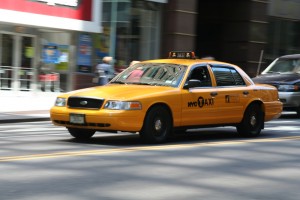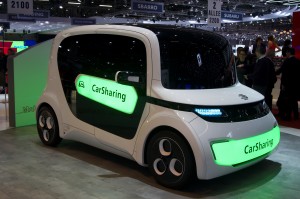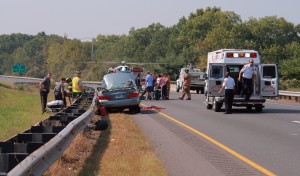You don't own a car but you need to drive. The vehicle needs to be covered by auto insurance and you can not afford a high premium. What do you do? Simply purchase non-owner car insurance coverage to protect against physical damage, liability and medical payments claims. Rates are typically about 40%-60% lower than conventional policies, and you can get covered quickly and easily. Same-day policies and low down-payments are offered by many companies, and coverage can be canceled by you at any time.
Billing and benefits can be easily customized to match your budget, and policies can be used as secondary coverage if a primary policy is active. However, damages to the vehicle you are driving are not covered if the accident is your fault. If you are purchasing or leasing a vehicle, another form of coverage may be needed, including specified minimum required liability limits. Many leasing companies require minimum liability limits of $100,000/$300,000/$50,000. Maximum collision and comprehensive deductibles are often $500 or $1,000.
We explain what benefits are the most important to have, how you find the cheapest policy, which companies offer the lowest rates, and the easiest method to purchase a policy without paying any fees or extra charges. Car-sharing and renting of vehicles has become more popular, so the need for non-owner policies is increasing. Although city transit systems are often available, they may not be accessible or reliable, depending on your location. The cost of taxis may also be quite costly with service not reliable, and sometimes not very safe. Prices can greatly vary, and in larger metropolitan areas, the cost is often extremely expensive.
Often, it is much quicker to use your Uber or Lyft iPhone app, and simply click and get a ride! Depending on where you live, the wait can be less than 10 minutes, or you can schedule a ride in advance. These services are especially helpful for travelers that need to find transportation to airports, persons that are temporarily visiting a city, and vehicle-owners that have no substitute transportation coverage through their auto insurance policy.
Zipcar also offers similar services, and their market share has been recently expanding in other areas. However, it is not likely that Zipcar will overtake Uber and Lyft market share in the US. Throughout most of the Midwest, Uber remains the most popular option.
Since car-ownership is reducing, this type of policy will also be offered by more carriers over the next 5-10 years. One of the biggest variables is how far local and state regulation will evolve to address the mandatory liability concerns. Policies will continue to be offered in larger cities and metropolitan areas, as opposed to smaller rural sections. For example, in Pennsylvania, although Pittsburgh, Harrisburg, and Philadelphia have many ride-share participants, in smaller cities, such as Carlisle, Johnstown, Lancaster, New Stanton, or Hershey, it's not as popular. However, each year, more major insurers are beginning to develop and offer policies to the public.
Who Needs It?
If you borrow a friend or relative's vehicle, and you do not reside in their household, you are unlikely to be listed as a covered party on their policy. Assuming they have existing coverage, it is possible their policy will extend liability benefits to you. But what happens if their liability limits are not sufficient to pay for the damages you cause? Or, what do you do if their policy unknowingly lapsed and they are without coverage?
Driving a company car for business-usage is also another situation that may require a special policy. Higher liability limits are often needed, along with special commercial benefits and riders. If you own your own vehicle, it's important to maintain adequate liability limits that are substantially higher than the state-mandated limits. Leased vehicles will always require higher bodily injury and property damage limits.
For example, if the owner of the vehicle carried the state minimum limits (perhaps $20,000 of bodily injury and/or $10,000 of property damage), you could easily become liable for a large amount of money from a legal judgment. Pain and suffering, along with physical damage to other vehicles and property could add up quickly. However, a non-owned policy would supplement the other in-force coverage and pay the damages you caused.
Instead of owing $100,000 and paying monthly payments for the rest of your life, you could conceivably have the entire judgment covered and pay nothing. Or, the plaintiff may accept the limits that your personal policy provides, and consider that amount as sufficient for reimbursement of all damages. Out-of-court settlements are very popular and a cost-effective way to secure a smaller settlement.
If you rent a car, then you know how expensive it is. Whether it is Avis, Hertz, Enterprise, Thrifty, Alamo, or Budget, although the cost of the rental car itself may be tolerable, the added insurance cost (you would have to accept full coverage) will add up quickly. However, when you have your own policy, the extension of bodily injury liability will allow you to pay much less, since you can "opt out" of expensive benefits. The cost of these "benefits" is often as much as $50-$150 per week if you don't have the right policy. And the provided limits may be less than the coverage you have on your personal policy. Contents of the vehicle are typically not covered, unless you have added a rider to your homeowner's insurance.
Consider A Loss Damage Waiver
A Loss Damage Waiver (LDW) can also be purchased that will provide protection against gaps in coverage between your own policy and the benefits provided by the rental company. A common example is the "loss of use" (or revenue) the company loses by having the vehicle in the shop being repaired. Of course, if an unauthorized driver operates the vehicle (perhaps a teenage son or daughter), you risk voiding coverage. Before you borrow or rent a vehicle, make certain that drivers under the age of 21 are extended the same benefits as adults. Otherwise, you may want to consider not allowing your children drive your rented vehicles. Also, any dependent that previously had their license suspended, should not operate your rented vehicle. If they reside in your household, an exclusion may be available that could potentially lower your rate.
Important Note: If you have not owned a vehicle for a significant amount of time (12 months or more), when you purchase a car (or truck) and need state-required liability insurance, it is likely you will not receive the carrier's "preferred" rate. Generally, once you have been continuously covered for 12-36 months (depending on the company), you will become eligible for a better rate and additional discounts. Having prior uninterrupted required liability coverage is typically a prerequisite to receive a carrier's best pricing.
Many companies own separate smaller subsidiaries that write their non-standard business. Once you have driven 1-2 years without a moving violation or at-fault accident, you may be able to move back to the preferred tier. A common perk of the preferred tier is avoiding a surcharge for the first at-fault accident and collision deductible credits.
Car-Sharing Services Such as Uber, Lyft Or Zipcar
If you participate in a car-sharing service, although state regulations are slowly changing, you will probably need to have your own protection. Since the standard policy does not extend to vehicles that are shared, this gap must be covered. And typically, only state minimum liability limits are provided on this type of risk. Several carriers will match the actual coverage on your vehicles to a shared vehicle, although a surcharge may apply. Additional carriers offer separate coverage.
In the past, many states and city jurisdictions took a "wait and see" approach regarding the legality of many car-sharing services. For example, in Philadelphia, Uber and Lyft had to wait years before any local legislation was passed. One of the core issues has always been safety of passengers along with ensuring that persons that did something criminal would be immediately terminated and all driving privileges suspended. Lyft and Uber have were previously assessed fines in Pennsylvania for conducting business, despite orders to temporarily halt operations.
Philadelphia Parking Authority (PPA) inspectors often report serious issues with taxis and ride-share vehicles. Previous discovered issues have included unsafe tires, leaking gas tanks, cracked bumpers, exhaust escaping into the vehicle cabin, and fecal material on seats. Additional revenue can be raised that would improve the inspection process, although specific legislation has not been passed yet. Non-owner car insurance will become increasingly popular in larger cities, especially if legislation can not be passed that helps the companies that provide ride-sharing services.
Google previously launched a carpooling service that they hope will eventually become nationwide. Available through the Waze navigation app, the service is similar to other car-sharing services. It seeks to match riders who need transported, with drivers that can provide the ride. Potential carpool partners that live within close proximity of each other, are matched, in an effort to reduce the number of vehicles on the road. Walmart and Adobe workers in parts of California had access before any other consumers.
You determine which persons you choose to carpool with. The app allows you to customize a profile (same sex, co-worker, etc...) of potential drivers. Drivers are easily connected after the destination address is entered. Road reports, accidents, and hazardous situations can also be reported to other drivers that may be taking the same route. Online map contributors also update route data to ensure the highest accuracy. More contributors may be needed as market share increases. However, the accuracy of the information provided must continue to be monitored for accuracy.
It's possible that you may have owned and operated a vehicle for your entire adult life and don't need ride-sharing services. But now, whether because of change of address, job, or other reasons, you won't own a vehicle for an extended period of time -- Perhaps ride-sharing should be considered. Since your utilization will be low, this situation is ideal. Of course, if your circumstances change and you acquire a car, a conventional policy can be purchased, and you can continue to use Uber or any other company. Regardless, ride-sharing will always be used for transportation to and from airports, visitors to to the United States, and temporary situations where another vehicle is not accessible.
The Importance Of Keeping Your Policy Active
If you wish to maintain continuous coverage, non-owner policies will avoid a lapse in benefits. This is important, since once you have a gap, obtaining standard/preferred policies becomes more difficult because you may be moved to the "non-standard" classification. The increase in premium could be negligible, or could be more than 50%, since the underwriting risk substantially increases. High-risk coverage is easily available, but many carriers place you in a separate "tier" until your risk reduces. If you have had a recent DUI, DWI, suspended license, or major violation, it is not be a good idea to offer ride-sharing services.
Several companies also use special subsidiaries reserved exclusively for their high-risk drivers. For example, Nationwide, State Farm, MetLife, Geico, and many other carriers own separate subsidiary companies that handle their non-standard business. Several of the most popular high-risk insurers are: Geico Casualty, Titan, Affirmative, Victoria, and Dairyland. Progressive began their operations as solely a high-risk carrier, but transitioned to include more diverse lines of business. Currently, most of Progressive's policies are issued to preferred and standard drivers. Additional property and casualty lines of business are also available.
State license regulations may require you to provide proof of a policy, even if you do not own a vehicle. Typically, this is required if your driver's license has been suspended and you are attempting to reinstate it. If and when you purchase a car, you can switch to a conventional policy. NOTE: Without a valid driver's license, you can not rent a vehicle. Your spouse can rent a vehicle, but you will be excluded as a driver. And there also may be a limitation on teenagers in the household that wish to drive.
Also, you may be required to purchase the optional "collision" coverage which can easily increase the daily rate by as much as 50%-100%. A maximum deductible may be required. Typically, that deductible (if applicable) will range from $500-$1,000.
If you don't own a permanent home because of travel (either pleasure or job-related), and you are either borrowing or renting other vehicles, you also may benefit from this type of policy. Instead of relying on a stranger's promise that you are "covered," securing your own policy that travels with you, is a much better alternative. You would have an ID card with current effective dates. If a declarations page was needed, you could fax or email the requested requirements. Texting may also be an option.
The best car insurance rates in New York, for example, are quite high. So in these types of states, sharing services are growing in popularity. Cheaper than a taxi, services like Uber will arrive quickly, and get you to your destination at an affordable cost. Verifying your driver's background is also becoming quicker and easier. However, in Manhattan, the Bronx, and other heavily-populated areas, sometimes the subway is a quicker, and certainly cheaper mode of transportation.
If you visit multiple states, they are likely to have different minimum required liability limit requirements. Also, some states may be "no-fault" with varying degrees of tort reform legislation. Your own private policy will be able to be used in all states.
What Is Covered?
Typically, bodily injury per person and per occurrence are covered, although they will be subject to the limits of the contract you purchase. These limits will will pay judgements over and above the existing coverage on the vehicle you are using. Pain and suffering resulting from a serious accident are one of the most common claims that are filed.
What Is Not Covered?
If you regularly operate a vehicle (either at work or home), you are likely listed as a covered driver on the private or corporate policy. In these types of situations, you will not be helped by a non-owned policy.
Traditional collision and comprehensive coverage (physical damage) are sometimes not covered. So if you are involved in an accident, property damage you cause will paid. But damage to the car or truck you are operating may not be covered along with your medical payments. Also, if you take possession of a title (ownership) of a vehicle, either via purchase, gift or inheritance, it will not be covered.
States With Cheapest Non-Owner Car Insurance Rates
California
Alaska
Indiana
Iowa
Maine
Nebraska
Ohio
South Dakota
Washington
Wisconsin
Impact Of Car-Sharing Services
Car-Sharing companies allow drivers to rent or lease vehicles on a commercial basis. Even Enterprise is now offering the service. The concept of "peer-to-peer" has also resulted in the creation of several new business models that match needy customers with willing drivers. Although the concept is steadily growing, and its biggest impact so far, has been in bigger urban areas such as Boston, Miami, San Diego, Seattle, Chicago and Portland. However, there are about 2 million members across the world that share. And every month
Often, the rental period is only for a day, and sometimes for just a few hours. And you can also rent "by the minute." We don't believe that renting for 10-15 minutes is cost-effective, but it is available. And when you consider that you don't pay for gas, maintenance or repairs, you can see why it's a growing business. However, long-term renting (more than 45 days) is generally very expensive, when compared to other options.
It is estimated that fewer new cars will be sold as these types of services grow and expand into additional areas and both large and small cities. Already, more than 400,000 vehicle purchases have been lost and it is expected more than one million may be lost within the next seven years. Of course, from an environmental aspect, less vehicles on the road may mean less pollution.
In summary, If you borrow and/or rent vehicles frequently, non-owner car insurance plans may be the best solution to providing legal and necessary coverage. It can act as a good stop-gap plan, or an affordable and permanent solution for providing bodily injury and property damage benefits. We show you the best and least-expensive options for your area. As legislation changes, and additional options become available, we will update all recommendations. It is likely that rules and regulations will continue to differ from one state to another.
Additional Information
DADSS (driver alcohol detection system for safety) may be ready within the next five years. This technology senses when a driver has a blood-alcohol level of above .08. If the reading registers at that level (or higher), the vehicle will not start. If implemented, it's expected that thousands of lives would be saved and hundreds of millions of dollars would be saved in expenses.
Currently, alcohol interlocks are utilized when drunk drivers are arrested (in some states). However, they don't help stop intoxicated persons that are never arrested by authorities.



